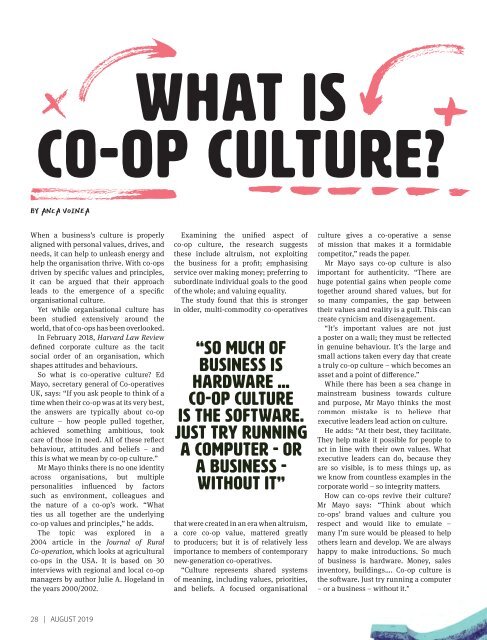Co-op News (August 2019)
What is co-operative culture - and why does it matter? This issue looks at how co-op values intersect with the values in organisations, across movements and between countries. Plus 100 years of the Channel Islands Co-operative – and how the new Coop Exchange app is tackling the capital conundrum.
What is co-operative culture - and why does it matter? This issue looks at how co-op values intersect with the values in organisations, across movements and between countries. Plus 100 years of the Channel Islands Co-operative – and how the new Coop Exchange app is tackling the capital conundrum.
Create successful ePaper yourself
Turn your PDF publications into a flip-book with our unique Google optimized e-Paper software.
BY ANCA VOINEA<br />
When a business’s culture is pr<strong>op</strong>erly<br />
aligned with personal values, drives, and<br />
needs, it can help to unleash energy and<br />
help the organisation thrive. With co-<strong>op</strong>s<br />
driven by specific values and principles,<br />
it can be argued that their approach<br />
leads to the emergence of a specific<br />
organisational culture.<br />
Yet while organisational culture has<br />
been studied extensively around the<br />
world, that of co-<strong>op</strong>s has been overlooked.<br />
In February 2018, Harvard Law Review<br />
defined corporate culture as the tacit<br />
social order of an organisation, which<br />
shapes attitudes and behaviours.<br />
So what is co-<strong>op</strong>erative culture? Ed<br />
Mayo, secretary general of <strong>Co</strong>-<strong>op</strong>eratives<br />
UK, says: “If you ask pe<strong>op</strong>le to think of a<br />
time when their co-<strong>op</strong> was at its very best,<br />
the answers are typically about co-<strong>op</strong><br />
culture – how pe<strong>op</strong>le pulled together,<br />
achieved something ambitious, took<br />
care of those in need. All of these reflect<br />
behaviour, attitudes and beliefs – and<br />
this is what we mean by co-<strong>op</strong> culture.”<br />
Mr Mayo thinks there is no one identity<br />
across organisations, but multiple<br />
personalities influenced by factors<br />
such as environment, colleagues and<br />
the nature of a co-<strong>op</strong>’s work. “What<br />
ties us all together are the underlying<br />
co-<strong>op</strong> values and principles,” he adds.<br />
The t<strong>op</strong>ic was explored in a<br />
2004 article in the Journal of Rural<br />
<strong>Co</strong>-<strong>op</strong>eration, which looks at agricultural<br />
co-<strong>op</strong>s in the USA. It is based on 30<br />
interviews with regional and local co-<strong>op</strong><br />
managers by author Julie A. Hogeland in<br />
the years 2000/2002.<br />
Examining the unified aspect of<br />
co-<strong>op</strong> culture, the research suggests<br />
these include altruism, not exploiting<br />
the business for a profit; emphasising<br />
service over making money; preferring to<br />
subordinate individual goals to the good<br />
of the whole; and valuing equality.<br />
The study found that this is stronger<br />
in older, multi-commodity co-<strong>op</strong>eratives<br />
“SO MUCH OF<br />
BUSINESS IS<br />
HARDWARE …<br />
CO-OP CULTURE<br />
IS THE SOFTWARE.<br />
JUST TRY RUNNING<br />
A COMPUTER - OR<br />
A BUSINESS -<br />
WITHOUT IT”<br />
that were created in an era when altruism,<br />
a core co-<strong>op</strong> value, mattered greatly<br />
to producers; but it is of relatively less<br />
importance to members of contemporary<br />
new-generation co-<strong>op</strong>eratives.<br />
“Culture represents shared systems<br />
of meaning, including values, priorities,<br />
and beliefs. A focused organisational<br />
culture gives a co-<strong>op</strong>erative a sense<br />
of mission that makes it a formidable<br />
competitor,” reads the paper.<br />
Mr Mayo says co-<strong>op</strong> culture is also<br />
important for authenticity. “There are<br />
huge potential gains when pe<strong>op</strong>le come<br />
together around shared values, but for<br />
so many companies, the gap between<br />
their values and reality is a gulf. This can<br />
create cynicism and disengagement.<br />
“It’s important values are not just<br />
a poster on a wall; they must be reflected<br />
in genuine behaviour. It’s the large and<br />
small actions taken every day that create<br />
a truly co-<strong>op</strong> culture – which becomes an<br />
asset and a point of difference.”<br />
While there has been a sea change in<br />
mainstream business towards culture<br />
and purpose, Mr Mayo thinks the most<br />
common mistake is to believe that<br />
executive leaders lead action on culture.<br />
He adds: “At their best, they facilitate.<br />
They help make it possible for pe<strong>op</strong>le to<br />
act in line with their own values. What<br />
executive leaders can do, because they<br />
are so visible, is to mess things up, as<br />
we know from countless examples in the<br />
corporate world – so integrity matters.<br />
How can co-<strong>op</strong>s revive their culture?<br />
Mr Mayo says: “Think about which<br />
co-<strong>op</strong>s’ brand values and culture you<br />
respect and would like to emulate –<br />
many I’m sure would be pleased to help<br />
others learn and devel<strong>op</strong>. We are always<br />
happy to make introductions. So much<br />
of business is hardware. Money, sales<br />
inventory, buildings…. <strong>Co</strong>-<strong>op</strong> culture is<br />
the software. Just try running a computer<br />
– or a business – without it.”<br />
28 | AUGUST <strong>2019</strong>


















